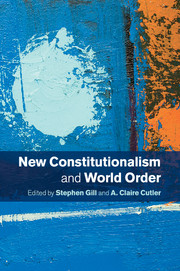Book contents
- Frontmatter
- Contents
- List of Figures
- List of Contributors
- Acknowledgements
- List of Acronyms
- 1 New constitutionalism and world order
- Part I Concepts
- Part II Genealogy, origins and world order
- Part III Multilevel governance and neo-liberalization
- Part IV Trade, investment and taxation
- 10 How to govern differently
- 11 Trade agreements, the new constitutionalism and public services
- 12 New constitutionalism, international taxation and crisis
- Part V Social reproduction, welfare and ecology
- Part VI Globalization from below and prospects for a just new constitutionalism
- Glossary
- Appendix
- Bibliography
- Index
11 - Trade agreements, the new constitutionalism and public services
from Part IV - Trade, investment and taxation
Published online by Cambridge University Press: 05 February 2014
- Frontmatter
- Contents
- List of Figures
- List of Contributors
- Acknowledgements
- List of Acronyms
- 1 New constitutionalism and world order
- Part I Concepts
- Part II Genealogy, origins and world order
- Part III Multilevel governance and neo-liberalization
- Part IV Trade, investment and taxation
- 10 How to govern differently
- 11 Trade agreements, the new constitutionalism and public services
- 12 New constitutionalism, international taxation and crisis
- Part V Social reproduction, welfare and ecology
- Part VI Globalization from below and prospects for a just new constitutionalism
- Glossary
- Appendix
- Bibliography
- Index
Summary
Trade and investment agreements are a key feature of the emerging ‘de facto constitutional governance structure for the global economy’ that Stephen Gill refers to as ‘the new constitutionalism’. This theoretical approach reveals the coercive and anti-democratic character of disciplinary neo-liberalism in general, and of trade and investment agreements in particular. It contrasts with the mainstream discourse, which portrays such agreements, and their increasing reach and complexity, as inevitable and irresistible steps in the creation of a single global economy. Fundamentally, ‘the aim of the new constitutionalism is to allow dominant economic forces to be insulated from democratic rule and popular accountability’ (Gill 1998b: 23).
As Stephen Clarkson and David Schneiderman have both argued, trade and investment agreements serve as external, quasi-constitutions that protect and privilege the interests of corporate capital and transnational investors (Clarkson 2002; Schneiderman 2005). Much like domestic constitutions, they bind governments over long periods of time to legally enforceable disciplines that are difficult to change. Yet these agreements lack the legitimacy and normative power of domestic constitutions (Van Harten 2010: 9–10).
- Type
- Chapter
- Information
- New Constitutionalism and World Order , pp. 179 - 196Publisher: Cambridge University PressPrint publication year: 2014
- 5
- Cited by



